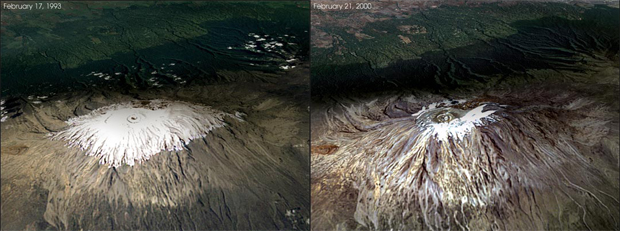Mount Kilimanjaro is known as the highest mountain in Africa. In recent years, as global warming and man-made climate change has become the news of the day, the shrinkage of Kilimanjaro’s glaciers has been cited as indisputable proof that mankind’s effects on global warming and climate change are responsible… for…
It’s being challenged? Huh. How about that.
University of Alabama in Huntsville professors Jonathan Fairman and Udaysankar Nair, along with University of Innsbruck’s Thomas M�lg have released findings that claim that the recession of the glaciers at the summit of Kilimanjaro is a result of a lack of precipitation due in large part not to global warming, but to the way the land is being utilized.
The basic gist of it? More urbanization of the areas around Kilimanjaro (likely due to increased tourism? – JW) decreases the size of the forests around Kilimanjaro. The lack of forests creates less wind resistance, allowing for higher wind speeds and therefore allowing the precipitation to converge at higher elevations, essentially blowing the moisture needed to sustain the glaciers over the mountain.
That is a very basic breakdown of it. A slightly more detailed explanation from the Journal of Geophysical Research:
Clouds occur less frequently in response to deforestation, with the magnitude of decrease increasing with deforestation. On the windward side, cloud liquid water path (LWP) and precipitation both show decreases at lower elevations (?1000�2000 m) and increases at higher elevations (2000�4000 m) in response to deforestation. This pattern is caused by decreased aerodynamic resistance, leading to enhanced wind speeds and convergence at higher elevations.
So, while climate change (man-made or otherwise) may lead to food shortages, it looks as though the Kilimanjaro glacier disappearance is due almost entirely to deforestation. Yet another reminder that it’s not just what we put in the air that matters, it’s how we use the land.
 Gearfuse Technology, Science, Culture & More
Gearfuse Technology, Science, Culture & More




Nature, not to be commanded, is to be obeyed. Ignore that and our lives could be the price to be paid.